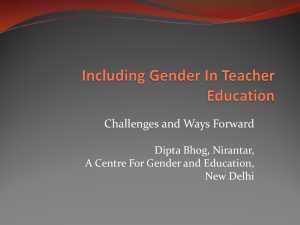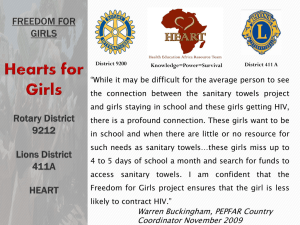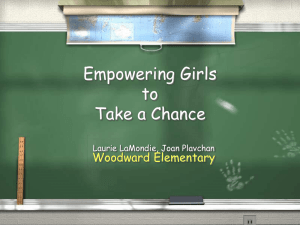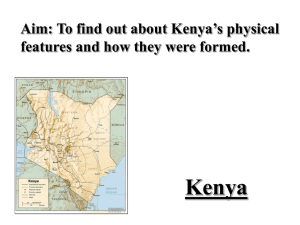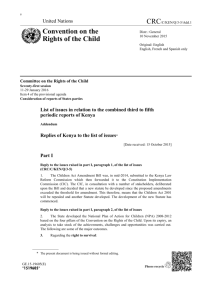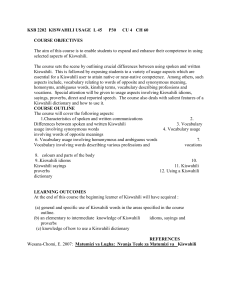Jane Adeny Memorial School - Northern Illinois University
advertisement
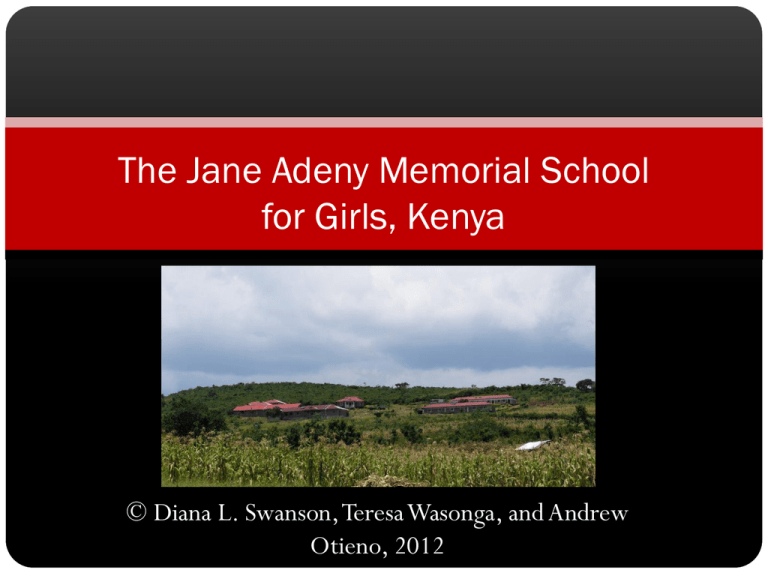
The Jane Adeny Memorial School for Girls, Kenya © Diana L. Swanson, Teresa Wasonga, and Andrew Otieno, 2012 This presentation is dedicated to the future of Kenya and with joy in the Nobel Laureates of 2012 Leymah Gbowee Ellen Johnson Sirleaf Tawakkul Karman and in Memory of 2004 Nobel Peace Laureate, the late Prof. Wangari Maathai The Mission & Goals of JAMS Create “a school good enough for the richest, open to the poorest” (Horace Mann) Be an innovative pedagogical model for the nation Empower students to ask questions Show that corporal punishment is unnecessary Create an active, collaborative learning environment Show that enriching the learning environment gets good results (library, extracurricular activities) Empower girls to become women who participate fully in the life of the nation The Founding Class of 2014 The Class of 2015 JAMS Enrollment in 2012 1 (9th grade): 33 • Form 2 (10th grade): 22 • Increased from 12 to 55 in one year! • Form Some of the students’ experiences • Lost her father to AIDS and now her mother is dying • Orphaned at age 5, lived with her poverty-stricken grandmother, roamed the countryside to find sugar cane to sell in order to buy food • Her widowed father went insane and now wanders the streets of the local village • Pushed her wheel-chair-bound father 6K to ask for help to go to school • Beaten by her father when she protested his beating of her mother • Lives on one meal a day at home Poverty in Kenya • Total population: 41.1 million people • 46% of total population lives below the national poverty line • 20% live on less than $1 a day • Men’s employment rate: 61.2% • Women’s employment rate: 49.1% Education in Kenya • 98% of children start primary school • 45% finish primary school • About 23% enter secondary technical • 24% enter secondary school • 18.7% finish secondary school • 3% enter university training The “hidden curriculum” • Kenyan curriculum largely unaffected by women’s studies and gender-neutral curriculum development. • Girls in schools subjected to significantly higher levels of harassment, including sexual harassment, from students and from teachers, than boys. • “Teachers’ attitudes and behavior reveal lower expectations for adolescent girls, traditional assumptions about gender roles, and double standards about sexual activity.” Mensch and Lloyd, “Gender Differences in the Schooling Experiences of Adolescents in Low-Income Countries: The Case of Kenya,” Studies in Family Planning 29.2 (1998): 167-184. Why educate girls? They have the same existential value and the same right to develop their potential as boys. Educating girls is also necessary to eliminating poverty, epidemics, and inequality worldwide. “Investing in girls is . . . central to boosting development, breaking the cycle of intergenerational poverty, and allowing girls, and then women—50 percent of the world’s population—to lead better, fairer and more productive lives.” World Bank President, Robert Zoellick “ “Getting to Equal: How Educating Every Girl Can Help Break the Cycle of Poverty” <http://web.worldbank.org/WBSITE/EXTERNAL/TOPICS/EXTEDUCATION/0,,contentMDK:23009825~me nuPK:282424~pagePK:64020865~piPK:149114~theSitePK:282386,00.html> Return on Investment in the developing world Women and girls return ca. 80% of the money invested in them to their families and communities. Men and boys return ca. 40%. Source: Kurt Thurmaier, Professor of Public Administration, NIU, presentation to TeachGirlsGlobal, DeKalb, IL, April, 2011 The JAMS Campus Nyanza Province Kenya Nyanza is one of the smaller provinces of Kenya. Nyanza is relatively underresourced due to the political history of the nation since independence from Britain in 1963. NYANZA PROVINCE 2 kms and a 500 ft climb from the paved road to the school Classrooms, Science Room, and Library An English class discusses poetry A memoir workshop in the library with a TeachGirlsGlobal volunteer The Dormitory The Dormitory The Dining Hall The Dining Hall Guest House The Kenyan Secondary School Curriculum • Kiswahili Biology • English Business • Geography Agriculture • History Christian Religious • Mathematics • Physics • Chemistry Education These subjects are mandated and regulated by the national ministry of education. Discussing a returned exam with Mr. Samson JAMS results so far The students speak up and ask questions much more often than when they arrived The students express themselves in English and Kiswahili much better than when they arrived 2012 final, cumulative exam results: 12 students got As 16 students got Bs 23 students got Cs 3 students got Ds Recreation: Singing and dancing in the Dining Hall Doing a jigsaw puzzle for the first time The students play soccer every afternoon. Campus Sustainability Farming the campus Rainwater catchment Solar power Two of the students, happy and proud of their harvest of cow peas Chickens provide eggs for Friday’s egg stew. The school has a sealed septic system. Students doing laundry with rain water Students, staff, and friends harvesting maize Plans for growth Growth in enrollment •a new class added each year until all four secondary school forms (grades) are filled • total enrollment planned to be between 120 and 160 • additional teachers as enrollment grows • an administrator of residence life Construction of facilities • Teacher housing • More solar panels • Well ( to be drilled in January-February, 2013, supported by Rotary Clubs of Barrington and Morrison, Illinois) • Solar water heating system • Science building (3 laboratory classrooms) • More water tanks for rain catchment Three years ago, the school site looked like this. MUCH can be accomplished in the next three years! ASANTE THANK YOU


